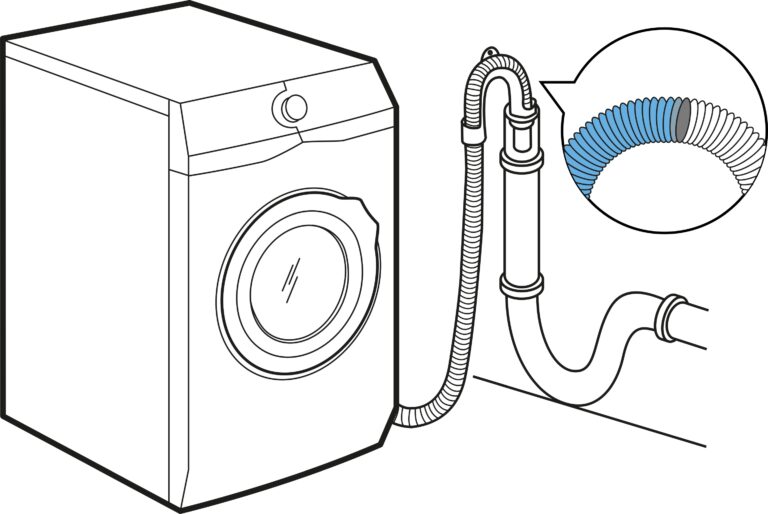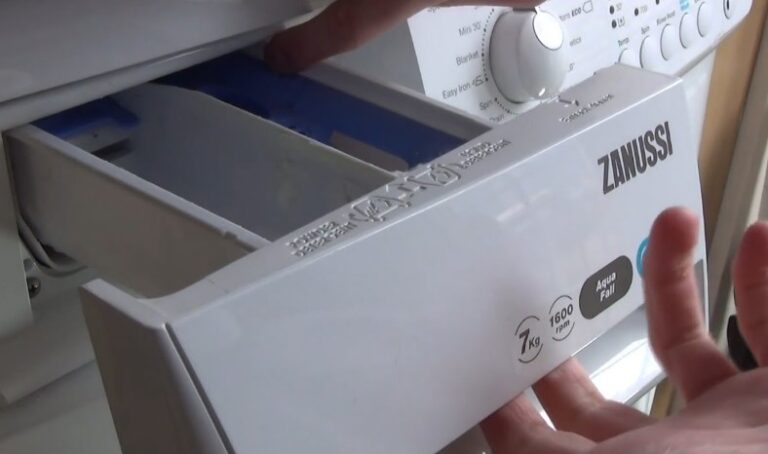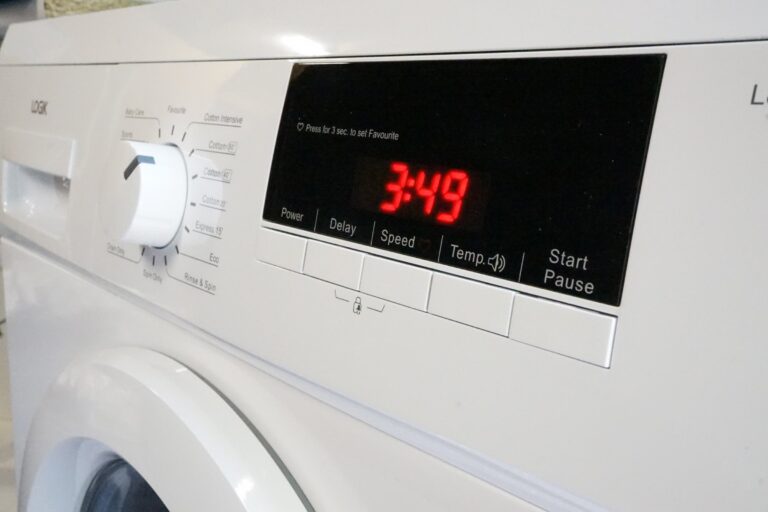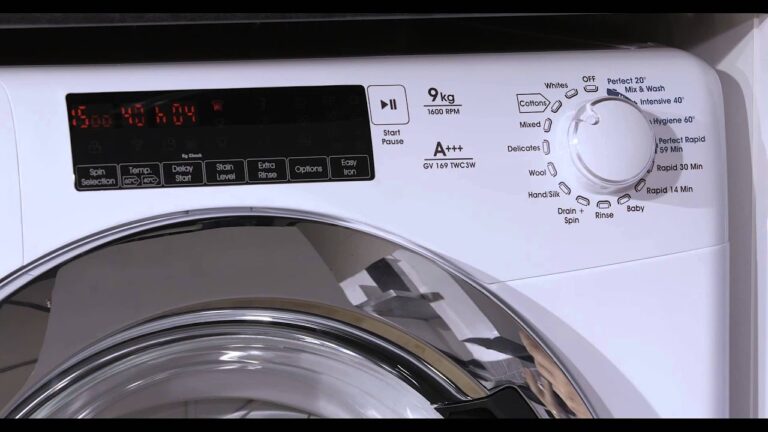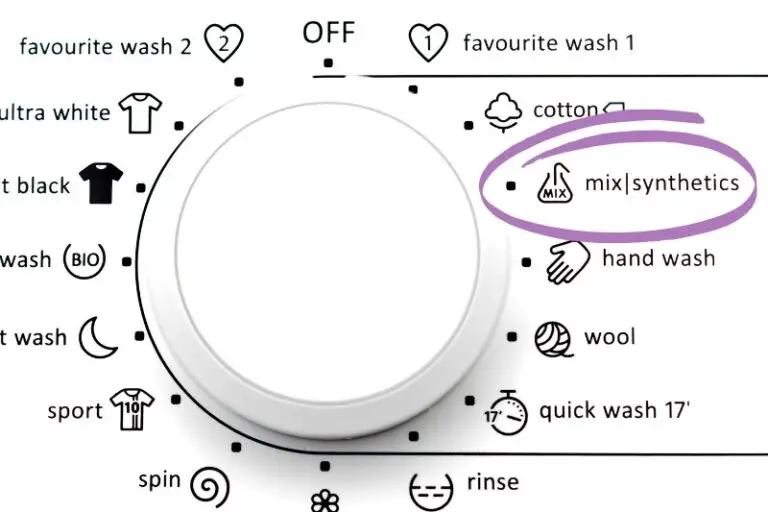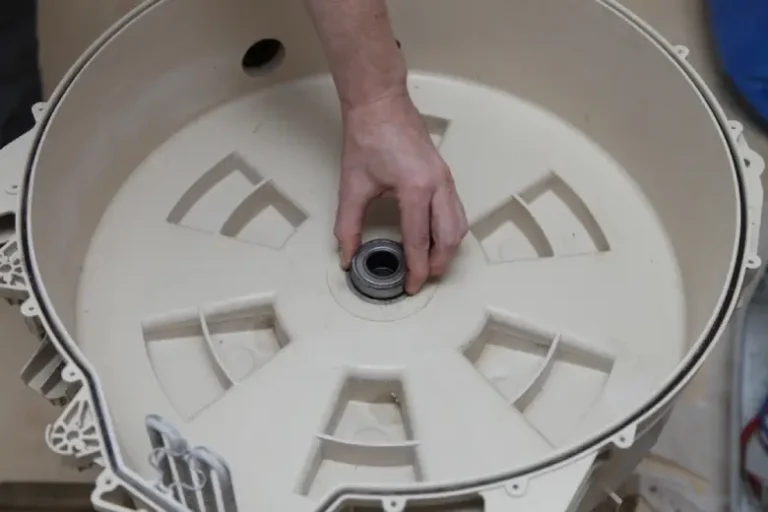Why is My Washing Machine Beeping During Cycle? Troubleshoot Now!
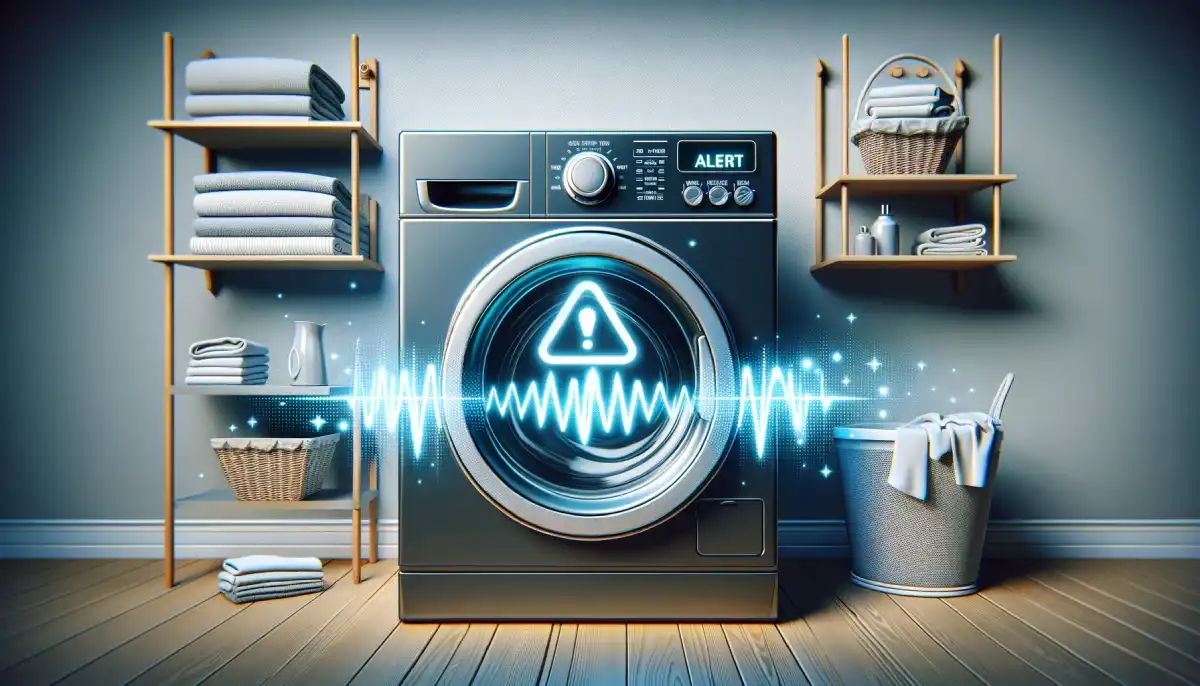
Your washing machine may beep during a cycle due to errors, notifications, or program alerts. Often, this signals a specific issue or a cycle completion.
Washing machines are indispensable home appliances, ensuring our clothes stay clean and fresh. When they start beeping mid-cycle, it can be an unwelcome interruption, causing concern for many homeowners. This acoustic signal is typically designed to draw your attention to various situations.
It could indicate that the wash cycle has finished, or maybe it’s alerting you to a potential fault or malfunction within the machine’s system. Troubleshooting the beeping noise requires understanding the machine’s error codes or operational signals, which are generally outlined in the user manual. A machine’s beeps can also denote a simple reminder, such as needing to add fabric softener or signaling the end-of-cycle phase. Regardless of the cause, addressing these beeps promptly will ensure the longevity and efficiency of your washing machine, keeping the laundry process smooth and stress-free.
Introduction To Washing Machine Beeps
Washing machines have become indispensable appliances in the everyday hustle of modern living. Yet, amid the whirring and swirling, an unexpected beep can disrupt the peace. These auditory signals are not just random sounds; they serve as critical communication tools between the appliance and the user. When your washing machine starts beeping during a cycle, it’s trying to flag down your attention for a variety of possible issues—from simple notifications to more pressing alerts. Navigating these beeps effectively can lead to smoother operation and longer-lasting appliances.
Understanding The Purpose Of Beeping Signals
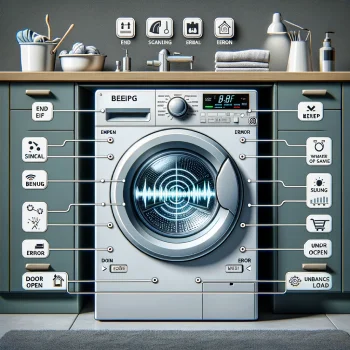
Beeping signals are designed to alert you of different situations with your washing machine. While they might seem like inconveniences at times, these sounds are part of a built-in communication system that aims to:
- Inform you when a cycle is complete or has been interrupted.
- Notify you of potential errors or malfunctions needing immediate attention.
- Remind you about maintenance tasks, such as cleaning the lint filter.
- Guide you through troubleshooting steps for minor issues that can be resolved without professional help.
Deciphering the precise cause of the beeping requires a basic understanding of these signals—an essential step for efficient washing machine use.
Overview Of Common Scenarios When The Washing Machine Beeps
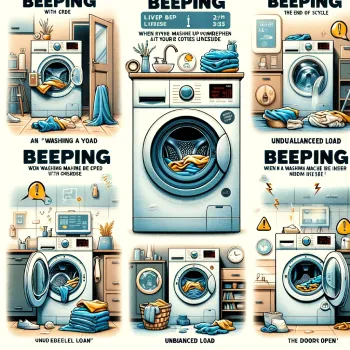
The beeping of a washing machine can be triggered under numerous circumstances. Some of the most common scenarios include:
- End-of-Cycle Notification: A series of cheerful beeps indicating the laundry is ready.
- Unbalanced Load: A rhythmical beep alerting you to rearrange your laundry for balanced weight distribution.
- Open Door/Lid: A safety alert that pauses the cycle until the door is securely closed.
- Error Codes: A sequence of beeps accompanied by alphanumeric codes highlighting specific issues.
- Water Supply Hiccups: Insistent beeping to inform you about water intake problems, perhaps due to a turned-off supply valve or a kinked hose.
- Blocked Drain: Beeping along with halted operations, often because of a clogged filter or pump.
Understanding these signals and their associated actions can lead to swift and effective resolutions that keep your laundry day on track.
Common Causes Of Beeping During Wash Cycles
Is your peaceful laundry routine being interrupted by a symphony of beeps? A washing machine that starts beeping during its cycle can disrupt more than just your serenity; it could be a cry for help from your appliance. Understanding the common causes behind the beeping alerts is the first step toward troubleshooting and fixing the issue. Let’s delve into the usual suspects that could be causing your washer to sound off mid-cycle.
Unbalanced Load Detection
An unbalanced load is one of the most frequent triggers for a beeping washing machine. Modern washers are designed with sensors to detect when laundry is unevenly distributed inside the drum. This can cause the machine to become unstable and potentially damage the unit over time. When the sensors kick in:
- The machine will pause.
- You’ll hear a beep or series of beeps.
- The display may flash an alert.
Redistributing the garments inside the washer often solves this problem. Heavy items like towels should be balanced out with lighter items to prevent future beeping alerts.
Door Or Lid Not Securely Closed
Safety mechanisms ensure that the door or lid must be securely latched before the washing machine operates. Should the door become ajar or fail to lock properly:
- The cycle will pause.
- A beeping sound alerts you to the issue.
Double-checking the closure might be all it takes to stop the beeping and resume the wash cycle.
Water Supply Issues
Washing machines require a consistent water supply to function correctly. If there’s an interruption or reduction in water flow, you may hear beep signals. This can arise from:
- Kinked hoses
- Partially closed valves
- Clogged filters
Checking and rectifying these issues will typically restore normal function.
Blocked Drain Or Filter
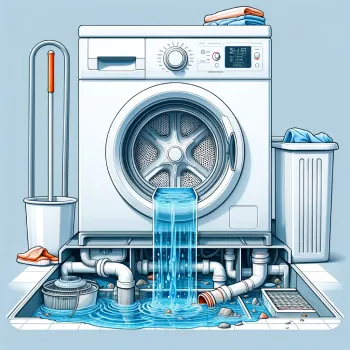
A blocked drain or filter can cause your machine to beep, indicating that it’s unable to drain water effectively. This might happen if:
- Foreign objects are obstructing the pump.
- Lint or debris has clogged the filter.
A cleanout of the relevant parts often resolves the issue.
Over-sudsing From Detergent
Too much detergent or the wrong type can lead to over-sudsing. When excessive suds are detected:
- The washer may stop mid-cycle.
- It alerts you with beeps.
- The display could show a particular error code related to suds.
Adjusting the amount of detergent or switching to a high-efficiency formulation can fix this issue.
Error Codes And System Malfunctions
Error codes and system malfunctions often manifest with an accompanying beep or series of beeps. These codes signal specific issues within the machine like:
Add additional rows as necessary
| Error Code | Possible Cause |
| F01 or E01 | Electrical problem or control board issue |
| F02 or E02 | Water heating error |
Consulting the user manual or a professional technician will be necessary to decode these beeps and resolve the underlying problems.
Step-by-step Troubleshooting Guide
It’s laundry day, and your peace is suddenly interrupted by an unexpected symphony of beeps from your washing machine. Even the most advanced machines can’t speak human, but those beeps are a cry for help. Your washing machine uses beeps and other signals to communicate specific issues. Let’s dive into a step-by-step troubleshooting guide to help you identify and resolve the mystery of the beeping washing machine.
Checking The Load Balance And Redistributing Clothes
An unbalanced load can cause your machine to become off-kilter, leading to that pesky beeping. To address this:
- Pause the cycle and open the lid or door.
- Check for heavy or absorbent items that may have clumped together.
- Gently redistribute the clothes to balance the load.
- Close the lid and resume the cycle.
Inspecting The Door Or Lid Closure Mechanism
A washing machine will beep if the door or lid isn’t securely latched. Here’s what to do:
- Interrupt the cycle and ensure no clothes are caught in the door.
- Clean any debris from the seal and locking mechanism.
- Close the lid or door firmly until you hear a click.
- If the beeping continues, inspect the latch for damage and consider a replacement if necessary.
Verifying Water Supply And Pressure
Insufficient water supply can trigger beeping. Ensure proper flow by:
- Examining the water hoses for kinks or blockages.
- Verifying that the water supply valves are fully open.
- Checking the water pressure in your home.
- Contacting a plumber if water pressure is consistently low.
Cleaning The Drain And Filter
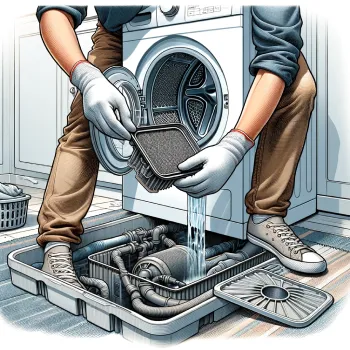
A clogged drain or filter might cause beeping. Follow these instructions:
- Turn off the machine and locate the drain filter.
- Clean out any lint, coins, or other obstructions.
- Rinse the filter and replace it securely.
- Run a short cycle to ensure the issue is resolved.
Adjusting Detergent Usage According To Water Hardness
Too much detergent or the wrong type for your water hardness can cause excess suds, leading to errors. Take these steps:
- Check your local water hardness and compare with the manufacturer’s recommendations.
- Measure the correct amount of detergent based on water hardness.
- Use high-efficiency (HE) detergent if your machine is a front loader.
Interpreting And Responding To Error Codes
Modern washing machines display error codes that correspond with specific issues. To respond properly:
- Refer to your washer’s manual to decipher the code.
- Follow the recommended action for that specific error.
- Contact customer service if the code is not listed or persists after troubleshooting.
When To Reset The Machine Or Disconnect the Power
Sometimes, a hard reset is necessary to clear glitches. Here’s how you reset:
- Disconnect the power by unplugging the washer or switching off the circuit breaker.
- Wait 1-2 minutes and then restore power to the machine.
- Choose a drain and spin cycle to verify that the beeping has ceased.
- If the issue continues, it may indicate a need for professional repair.
Advanced Diagnostics And Repairs
Advanced Diagnostics and Repairs: When your washing machine starts beeping mid-cycle, it can be a sign that it’s time for some troubleshooting. What many don’t realize is that behind those pesky beeps could lie a variety of potential issues, ranging from simple fixes to more complex problems needing professional attention. Understanding advanced diagnostics and moving forward with the right repairs is vital for getting your machine back in working order.
Using Service Modes For Diagnosis
Your washing machine is likely equipped with built-in service modes that can help diagnose the source of those mysterious beeps. Service modes are special diagnostic programs manufacturers include to help technicians and savvy homeowners identify errors and malfunctions in the system. To access service mode:
- Refer to your washing machine’s manual for specific instructions, as the process can vary by brand and model.
- Typically, you’ll press a sequence of buttons to initiate the diagnostic mode.
- The machine will then display error codes or run through tests that can pinpoint the issue.
- Note the error codes and consult your manual or online resources for explanations and recommended solutions.
Common Replacement Parts And How To Install Them
Some beeping problems can be resolved by replacing faulty parts. These common replacement parts include the door latch, water inlet valve, or control board. Here’s a brief guide on how to handle these replacements:
| Part | Signs of Failure | Installation Tips |
| Door Latch | Unplug the machine, remove the rear panel. Locate and replace the board, ensuring all cable connections match. | Switch off and unplug the machine. Remove the door panel to access the latch. Replace and reassemble. |
| Water Inlet Valve | Water does not fill the drum or fills slowly; unusual beeping during filling stage. | Shut off water, disconnect hoses, and replace the valve. Ensure all connections are tight to prevent leaks. |
| Control Board | Irregular beeping, cycle settings change randomly or won’t set. | Unplug the machine, and remove the rear panel. Locate and replace the board, ensuring all cable connections match. |
Always ensure to disconnect your washing machine from the power source before attempting any repairs to avoid electric shocks or other injuries.
Contacting A Professional For Complicated Issues
If you’ve gone through diagnostics and attempted straightforward repairs with no success, it may be time to call in a professional. Expert technicians can handle a range of more intricate issues such as:
- Internal electrical failures
- Complex mechanical problems
- Technical programming malfunctions
Seeking professional help assures quality repairs and can be especially important when warranties are at stake or when you’re dealing with sophisticated, state-of-the-art machines. Remember, tampering with certain components may void warranties or cause further damage.
To find a reputable technician, consider checking:
- Manufacturer’s authorized service provider listings
- Local business reviews and ratings
- Recommendations from friends or family
A professional can offer peace of mind as they bring expertise and the right tools for the job, ensuring your washing machine is up and running without causing further inconveniences.
Maintenance Tips To Prevent Future Beeps
Listening to your washing machine beep during a cycle can be a perplexing issue, but it’s often a cry for help signifying the need for maintenance. To avoid these disruptive beeps and ensure your appliance runs smoothly, a few simple maintenance tips could save you from future frustration. Regular upkeep not only prevents the irritating noise but also extends the life of your washing machine. Let’s explore some best practices that could lead to a quieter laundry day.
Routine Cleaning Best Practices
Keeping your washing machine clean is paramount to preventing those unexpected beeps during a cycle. The accumulation of dirt, soap scum, and mineral deposits can interfere with the sensors and mechanics of your appliance, leading to error signals in the form of beeps. Here’s how to maintain a clean washing machine:
- Clean the washtub: Once a month, run an empty cycle with hot water and a cup of white vinegar to flush out any lingering detergents or fabric softener.
- Wipe down the gasket: For front-load washers, clean the rubber seal with a damp cloth to remove any mold or mildew.
- Inspect and clean filters: Regularly check and clean the lint and drain filters to prevent clogging and ensure efficient water drainage.
- Leave the door open: After each use, keeping the door slightly ajar allows air circulation, which helps prevent odor and mold build-up.
Regular Maintenance Schedule For Longevity
A regular maintenance schedule is key to the longevity of your washing machine. Paying attention to daily use and routine inspections can keep your machine in top condition. Consider these tips:
| Maintenance Task | Frequency |
| Inspect hoses for bulges or leaks | Monthly |
| Check and tighten hose connections | Bi-annually |
| Test the washing machine balance | Quarterly |
| Clean and sanitize the dispensers | Monthly |
Choosing The Right Detergent And Additives
Using the appropriate detergent and additives will not only keep your clothes clean but also protect your washing machine’s inner workings. Consider the following:
- High-Efficiency (HE) detergents: For HE washers, always use detergents labeled as HE to prevent excess suds which can cause pressure and sensor problems.
- Proper dosing: Follow the recommended detergent amount. Overuse can lead to excess buildup, while underuse might not effectively clean your laundry, leading to additional cycles and stress on your machine.
- Soften hard water: If you have hard water, use water softeners to prevent mineral buildup that might trigger sensor alerts.
- Avoid harmful additives: Certain bleach or fabric softeners can be abrasive over time. Use milder alternatives and ensure they’re suitable for your appliance.
Conclusion: Ensuring Peaceful Laundry Days
Unexpected beeping from your washing machine during a cycle can disrupt the soothing routine of laundry day. Understanding the root causes and addressing them swiftly ensures your appliance operates smoothly, giving you back the peace of mind you deserve.
Summarizing Key Takeaways For Trouble-free Operations
- Regular maintenance: Keep your washing machine clean and lint-free to prevent sensor disruptions that may cause beeping.
- User manual guidance: Consult the user manual for specific error codes associated with beeping, enabling timely solutions.
- Check door closure: Ensure the washing machine door is securely closed. A loose latch can trigger beeps.
- Balanced loads: Distribute clothes evenly to avoid an unbalanced drum, which is a common beep-causing issue.
- Filter inspection: Regularly inspect and clean the pump filter to avoid clogging, which can lead to beeping alerts.
- Water supply check: Verify that the water hoses are clear and the supply is adequate, as blockages or kinks can cause beeping.
- Service calls: For persistent beeping unrelated to the above issues, seek professional repair to diagnose and fix internal malfunctions.
The Importance Of Addressing Beeps Promptly
Timely responses to washing machine beeps not only ensure the longevity of your appliance but also prevent minor annoyances from escalating into costly repairs. Ignoring these alerts can lead to bigger issues, from damaged textiles to extensive water damage in your home.
Key actions include:
- Reading the error code and taking corrective steps as recommended by the manufacturer.
- Watching for patterns in beeping to identify and rectify user errors or mechanical faults.
- Utilizing customer service and professional technicians before small issues become major.
By addressing beeps promptly, you maintain not only the machine’s performance but also create an environment for stress-free laundry experiences. Attention to detail and swift action can transform a beeping washing machine from a source of frustration into a non-issue, rounding out an efficient home with appliances that work as intended.
Frequently Asked Questions
Why Does My Washing Machine Keep Beeping While Washing?
Your washing machine may beep during a cycle due to an unbalanced load, an obstructed drum, or an error code that requires attention. Check for unevenly distributed clothes or the user manual for specific error codes.
Why Is My Whirlpool Washing Machine Beeping During Cycle?
Your Whirlpool washing machine may beep during a cycle to indicate an error or a specific function alert. Check for error codes, ensure the door is properly closed, and consult the manual for specific troubleshooting steps.
Why Is My LG Washing Machine Beeping During The Wash Cycle?
Your LG washing machine may beep during the wash cycle due to an imbalance of the load or an error code alert. Check for unevenly distributed clothes and ensure the washer is level.
Why Is My Washing Machine Stopping Mid Cycle And Beeping?
Your washing machine may stop and beep mid-cycle due to issues like an unbalanced load, clogged filters, or a tripped lid switch. Check for any error codes displayed and consult the manual for specific troubleshooting steps.
Conclusion
Understanding your washing machine’s beeping signals is essential for maintaining its performance and lifespan. Regular maintenance and prompt attention to these alerts can prevent costly repairs. Remember, a beeping machine is calling for your attention for a reason. By addressing these sounds quickly, you ensure your appliance runs smoothly, keeping your laundry routine uninterrupted and stress-free.
More to Explore
- E03 Candy Washing Machine Is Top Effective Features: A Closer Look
- 15 Unseen Reasons Washing Machine Not Draining UK and How to Fix It Like a Pro!
- Indesit Washing Machine Not Spinning: Troubleshooting Guide and Tips to Fix the Issue
- 9 Helpful Benefits of Hiring a Local Washing Machine Repairman
- Do Washing Machines Need Hot Water?

